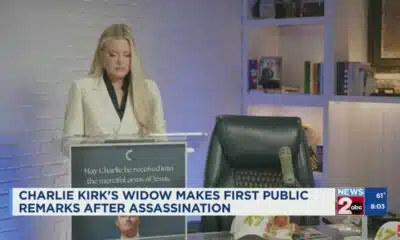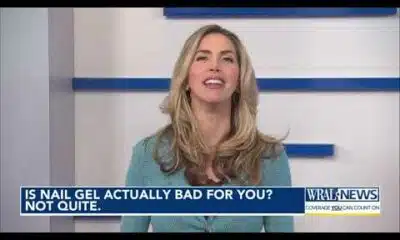News from the South - Georgia News Feed
Endangered Right Whale, other flora and fauna get new look in 10-year Georgia wildlife plan update
Endangered Right Whale, other flora and fauna get new look in 10-year Georgia wildlife plan update
by Leon Stafford, Georgia Recorder
March 10, 2025
Over the next 10 years, the North Atlantic Right Whale, the Chattooga River crayfish and the Sicklefin Redhorse fish may get some outsized attention from conservationists.
The aquatic creatures are among more than 1,000 plants, animals and habitats that are being included in Georgia’s 2025 State Wildlife Action Plan or SWAP.
The proposal, which is updated every 10 years to receive federal funds, safeguards Georgia’s wildlife and biodiversity by creating a wish list of species to shield from harm.
“The purpose is more on the proactive side in that we want to try to implement conservation activities and habitat management that will keep species from rising to the level where they are more costly to conserve or have to be listed on the endangered species act,” said Brett Albanese, plan coordinator for 2025 and an assistant chief with the Georgia Department of Natural Resources’ Wildlife Conservation Section.
“(The endangered species list is) an important tool but we don’t want to have to use that,” he said. “That’s the ambulance. We want to provide more preventive care for our wildlife.”
That may be a huge lift. Georgia has added nearly 1 million residents in the years since the last plan update in 2015. (There were around 10.2 million Georgians in 2015 compared to 11.18 million in 2024, the latest estimates available).
That has resulted in more pollution from cars, disappearing forests and land to make way for housing, shopping centers and warehouse, and noticeable changes in climate, all leading factors in the destruction of animal habitats and plant life, Albanese said.
Mike Worley, president and CEO of the Georgia Wildlife Federation and a member of the SWAP 2025 advisory board, agreed. He said the new plan will focus on creating hubs and corridors where species can migrate without human intervention.
“As the climate changes, our wildlife is going to have to adapt,” he said. “If we can, we want to allow corridors where plants and animals can move along to areas that fit their needs … It’s more efficient if the species can decide on their own.”
If approved, the plan update could receive around $1.5 million in funding, Albanese said. To receive the money, DNR is required to raise cost sharing revenue through funds generators such as sales of the state’s “Give Wildlife A Chance” license plates, Albanese said.
Georgia has evidence that SWAP efforts work. Several plants and animals that were on the SWAP 2015 list have experienced a modicum of recovery, Albanese said. Gopher tortoises, the red cockaded woodpecker and the smooth coneflower (also known as echinacea laevigata) were downlisted on the endangered species list.
A major goal for the 2025 update is to gain community support, Albanese said. The department recently launched a website to promote the proposal and elicit public comment, which is available on the site through March 21. In addition to conservationists and landowners, the department is hoping municipal leaders, the business community and everyday citizens will way in, Albanese said.
“We want them to have ownership of it, so they’ll help us implement the SWAP and provide other funding sources to complete projects,” he said.
Katherine Moore, president of the Georgia Conservancy, said SWAP creates a starting point for discussion on conservation. As it is not a regulatory document, it lacks mandates and cannot override land use priorities. Instead, it seeks to educate and allow thoughtful conversations on how we balance population growth with protecting our environment.
“Conservation and development should be an ‘and’” not or, she said.
Reese Thompson said public input from people on the ground is critical for SWAP’s success. Landowners experience firsthand the effects of habitat change or impacts to private property in the state.
For instance, Thompson, a Wheeler County tree farmer who lives in Vidalia, has been clearing downed trees and debris since Hurricane Helene barreled through the area in September.
Since then, he has been setting controlled fires to clear the forest floor to reduce the potential for wildfires and improve the habitats for animals who depend on the woods, he said. He’s also trying to avoid destructive brush fires that have the potential to devastate South Georgia like those that burned more than 18,000 homes in Los Angeles in January and have been linked to 29 deaths.
“We’ve been doing burning because this summer when all this heavy hurricane debris is on the ground and when it dries out, I’ve got fears that we’re going to look like Southern California,” he said.
Heather Brasell, a south Georgia landowner who owns forested property on a conservation easement, said message consistency is also critical to an effective plan update. The Department of Natural Resources, the Forestry Commission and the public need to be on the same page about the importance of getting the proposal through, especially as there is enormous scrutiny in Washington on national spending.
“Endangered species, in and of itself, doesn’t sell very well when people lack housing and food,” she said. “We need to make it clear the benefits of conservation in general and tie it to the places you can go for recreation, then that can make it more acceptable to the general public.”
GET THE MORNING HEADLINES.
Georgia Recorder is part of States Newsroom, a nonprofit news network supported by grants and a coalition of donors as a 501c(3) public charity. Georgia Recorder maintains editorial independence. Contact Editor John McCosh for questions: info@georgiarecorder.com.
The post Endangered Right Whale, other flora and fauna get new look in 10-year Georgia wildlife plan update appeared first on georgiarecorder.com
News from the South - Georgia News Feed
Trump calls on all NATO countries to stop buying Russian oil, threatens 50% to 100% tariffs on China
SUMMARY: President Donald Trump stated that the Russia-Ukraine war would end if all NATO countries stopped buying Russian oil and imposed 50% to 100% tariffs on China for its Russian petroleum purchases. Trump criticized some NATO members, like Turkey, Hungary, and Slovakia, for continuing to buy Russian oil, weakening NATO’s position. He downplayed recent Russian drone incursions into Poland, calling them possibly accidental. The U.S. and allies seek stronger resolve against Russia, with Britain banning Russian oil transportation vessels and sanctioning suppliers. Trump blamed Joe Biden and Ukraine’s Zelenskyy for the war, excluding Putin. The proposed tariffs risk economic fallout amid complex U.S.-China trade relations.
The post Trump calls on all NATO countries to stop buying Russian oil, threatens 50% to 100% tariffs on China appeared first on www.wsav.com
News from the South - Georgia News Feed
Westside getting defensive has paved the way to a rare hot start
SUMMARY: Westside football is off to a strong 3-0 start, a rare feat in 20 years, thanks to a dominant defense allowing just 21 points total. The Patriots have recorded 14 sacks and two pick-6s, with key wins over Laney and Richmond Academy. Coach Cedric Mason emphasizes fundamentals, hustle, and building a strong team culture involving the community. Senior Joshua Crawford, returning from a severe knee injury, credits improved coaching and increased staff support for the team’s success. After initial friction, Mason and Crawford developed a strong bond. The team remains focused on weekly goals, aiming ultimately for a state championship.
Read the full article
The post Westside getting defensive has paved the way to a rare hot start appeared first on www.wjbf.com
News from the South - Georgia News Feed
Several HBCUs close campuses amid 'potential threats'
SUMMARY: Several historically Black colleges and universities (HBCUs) were placed on lockdown Thursday due to potential threats to campus safety. Affected schools include Virginia State University, Hampton University, Southern University and A&M College, Bethune-Cookman University, Clark Atlanta University, and Alabama State University. Students and faculty were alerted early Thursday, with some lockdowns lifted by afternoon after law enforcement sweeps. No injuries were reported. School officials and law enforcement are investigating, urging vigilance. Congressman Troy A. Carter condemned the threats, calling for federal action. Classes were canceled Thursday, with some schools extending cancellations. Enhanced security remains in place as the situation develops.
The post Several HBCUs close campuses amid 'potential threats' appeared first on www.wsav.com
-
News from the South - North Carolina News Feed6 days ago
Reagan era credit pumps billions into North Carolina housing | North Carolina
-
News from the South - Alabama News Feed6 days ago
Amid opposition to Blount County medical waste facility, a mysterious Facebook page weighs in
-
News from the South - South Carolina News Feed6 days ago
South Carolina’s Tess Ferm Wins Miss America’s Teen 2026
-
News from the South - Kentucky News Feed6 days ago
3 states push to put the Ten Commandments back in school – banking on new guidance at the Supreme Court
-
Local News6 days ago
Duke University pilot project examining pros and cons of using artificial intelligence in college
-
News from the South - Missouri News Feed5 days ago
1587 Prime gives first look at food, cocktail menu ahead of grand opening in KC
-
News from the South - Virginia News Feed5 days ago
On the record: Winsome Earle-Sears
-
News from the South - North Carolina News Feed7 days ago
Powerball surges to $1.8B ahead of Saturday's drawing










































